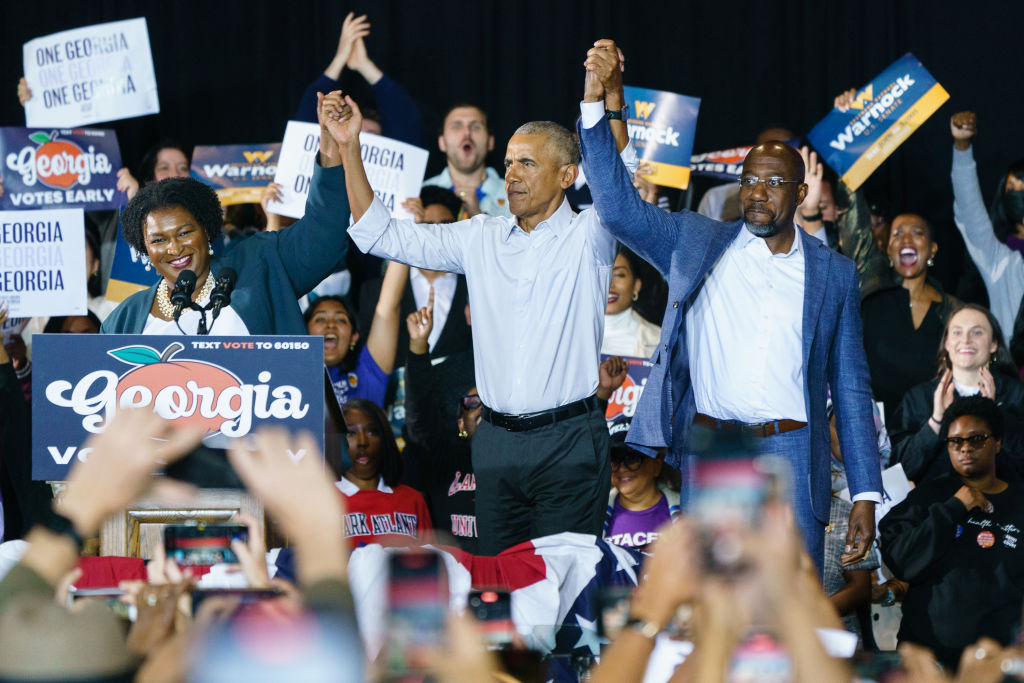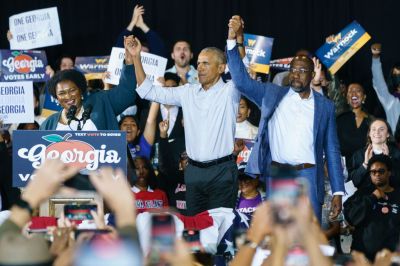Democrats have been trying to prepare themselves for what may be a very unhappy Election Day and its aftermath.
Lis Smith, as good a communications guru as any her party has, offered some great advice to her fellow Democrats in the Sunday New York Times on lessons to be learned from a loss, encouraging members of the blue team to recruit “candidates who might not check the box of every national progressive litmus test but who do connect with the voters in their state.”
But the headline gives away the mood for the party on election eve: “Democrats, Don’t Despair. There Are Bright Spots for Our Party.”
Oof.
Had you told most of the Times’ readers a year ago—heck, even two months ago—of that headline, they would have wondered what went wrong. If a party stalwart is telling readers of the leading news source for blue America “don’t despair,” things must be pretty bad. With Democrats poised to lose both chambers of Congress and even safe Senate seats in party strongholds like Washington state seem at least competitive, a Democrat from 2021 would have to wonder what went sideways.
Or what about the Democrats who were delighted about the havoc former President Donald Trump was wreaking in Republican primaries? What about the Democrats who gave money to prop up kooks and con artists in Republican primaries because they would be so easy to beat? What about the Democrats who told me they were excited about Republicans rallying around Trump after the FBI searched his Florida home because it meant Trump would definitely be the GOP nominee and “can’t win.”
All of those Democrats would look at “don’t despair” and, well … despair.
There can’t be despair without surprise. The hope that Democrats once had for a mild midterm storm or maybe even gains makes the moment of realization that this looks like a pretty typical midterm election harder for them to take. And that surprise is rooted in a fundamental misunderstanding about the nature of the two parties and voters’ views of them.
The truth is that both parties are unpopular and have been for most of this century. Americans’ disgust with the political system is mostly bunched up in partisan humps: Republicans hate Democrats and Democrats hate Republicans. But in the most recent Gallup survey, independent voters gave both parties identically low marks, with just 35 percent expressing favorable views of each. Democrats’ rating dropped 13 points from the start of the year to the fall, sliding into a tie with the consistently disliked GOP.
Democrats want to see themselves as the forces of goodness and light arrayed against an evil, anti-American Republican Party, that “democracy is on the ballot.” That can certainly be said of some Republicans, including some who are running for positions from which they could be in position to help Trump steal another term in 2024. But many Democrats now treat their opponents as illegitimate, the very sin Trump and his supporters are guilty of.
This is what the New York Times did in lumping together Republican candidates for Congress, governor, secretary of state, and attorney general who made bland expressions of concern about claims of election irregularities prior to January 6, 2021, with full-blown cranks and evident swindlers who are still banging their bongos to say that the “vast majority of Republicans running for these offices in November” have “questioned or spread misinformation about the 2020 election.”
You have to make it two-thirds of the way through the story before the writers give up the game: “Fewer than one-third have staked out the most extreme position—stating, without any evidence, that the election was stolen or rigged.”
But their opinion-side colleague Ezra Klein didn’t worry about that detail in his klaxon warning for Democrats: “The 2022 election is very likely to sweep into power hundreds of Republicans committed to making sure that the 2024 election goes their way, no matter how the vote tally turns out.” That's not even true by the weak standard set in his own paper’s article that he’s quoting, let alone a more skeptical examination.
But it feels true for many Democrats. I don't think Klein is conning anyone here. I assume he thinks what he wrote is true. It is true to him like the existence of widespread election fraud just feels true to many Republicans. They read cherry-picked or distorted accounts from the right-wing counterparts to Klein, and their feeling takes on the stony solidity of belief, impervious to contradictory information.
But here’s the thing for Democrats: There will be no de-Baathification of the Republican Party.
The “reckoning” for which many Democrats and some Republicans have yearned for years—the one in which Trump is ruined and all of the toadies who drooled on his golf shoes will either also be ruined or forced to come begging for forgiveness—is not to be. That’s not to say that Trump might not one day be ruined or that many who once sported red hats with pride will quietly abjure their MAGA membership. It’s just that these things don’t happen all at once.
Almost half of the Republicans in the Senate voted against censuring Sen. Joe McCarthy in 1954 after the Wisconsin red baiter drove one of his fellow senators to suicide with blackmail over the senator’s son’s homosexuality. Out of 206 Democrats in the House in 1998, only five could bring themselves to vote to impeach Bill Clinton for lying and obstructing justice to conceal his assignations with a 21-year-old White House intern, offenses he had obviously committed. It took decades in both cases for the parties to come to terms with what partisanship had blinded them to.
If the GOP ever comes back to being interested in governing again, it will come a little bit at a time.
Some of the same people who supported the invasion of Iraq and denounced some critics of the war as giving aid and comfort to the enemy also backed Trump when he said George W. Bush should have been impeached for the same actions. Some of them consciously changed their minds, or are at least aware of the shift. Many didn’t even notice their journey from the camp of Dick Cheney to the camp of Michael Moore.
This change in the GOP was in part because of the change in the way almost all Americans viewed the Iraq war, but also because the war was over and had been for years. By the time Trump started riffing about taking the oil and impeaching Bush, Republicans just weren’t invested in the defense anymore. Ideas that would have been heresy on the right in the Valerie Plame heyday of anti-Bush frenzy on the left sounded unremarkable or even appealing when they didn’t come at a political cost. The Democratic establishment now admires Bush for his decency and the leader of the Republican Party says he should have been removed from office. Betcha didn’t have that one on your bingo card.
How Democrats respond to what now looks to be somewhere between a sound drubbing and a real knouting will matter a great deal. The right way is to accept the will of the voters, take lessons about how to run better next time, and get ready to do battle in Congress. That’s the correct response to a high-turnout contest like the one we’re having now.
The wrong way is to do as Trump and his acolytes do and seek to delegitimize the results, either by blaming suppression or claiming that the Republican Party itself is illegitimate.
Democrats may think they have the moral high ground to make such pronouncements, but the persuadable voters who decide elections see them chucking rocks, not hurling thunderbolts.







Please note that we at The Dispatch hold ourselves, our work, and our commenters to a higher standard than other places on the internet. We welcome comments that foster genuine debate or discussion—including comments critical of us or our work—but responses that include ad hominem attacks on fellow Dispatch members or are intended to stoke fear and anger may be moderated.
With your membership, you only have the ability to comment on The Morning Dispatch articles. Consider upgrading to join the conversation everywhere.